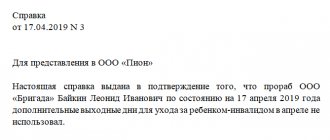Labor laws provide various rights and benefits for employees. New edition of Art. 262 of the Labor Code of the Russian Federation allows for the provision of additional days off to one of the working parents/guardians/guardians. They are paid. Number of days – 4 per month. As Art. 262 of the Labor Code of the Russian Federation, payment is made in the amount of average earnings. The calculation procedure is established by federal legislation. The rules for providing additional days are determined by the government. Women working in rural areas can count on an additional day off per month without pay.
Explanations of the Ministry of Labor
Considering Art. 262 of the Labor Code of the Russian Federation with comments from the Ministry, a number of nuances should be noted. First of all, these days are provided to one of the employed parents, trustees or guardians. To implement this opportunity, the subject of the law must fill out a sample application approved by Order of the Ministry of Labor No. 1055. According to Art. 262 Labor Code of the Russian Federation days are provided based on the order of the head of the enterprise. At the same time, as the Ministry of Labor explains, the person must submit a certificate from the social protection agency confirming that the child has a disability. This document must also indicate that the minor is not in a specialized institution on full state support. It should be noted that 5- and 6-day boarding houses do not belong to such institutions. The working parent/guardian/guardian must also provide a certificate from the spouse’s place of employment stating that, as of the date of application, paid days in the same month were not used (or partially used).
What are the differences
The need to consolidate guarantees for the provision of additional days off specifically in the Labor Code of the Russian Federation is based on the fact that when solving each specific case locally, there is a high probability that the employer will not accommodate the parents of a disabled person or a resident of a rural area and will refuse to provide days of rest. And one of the tasks of the state is to provide comprehensive assistance to these categories of the population.
The object of regulation of Article 262 of the Labor Code of the Russian Federation is two categories of workers:
- parents of a disabled child;
- representatives of the fair sex living outside the city, that is, in rural areas.
What these categories have in common is the need to devote more attention and time to their children and household compared to other parents.
The difference is that additional days for parents whose children are physically disabled are paid, but women can only count on the right to rest at their own expense.
The Labor Code only proclaims these rights, and the law enforcement act in this case is Government Decree No. 1048 (for parents).
As for residents of rural areas, which include all areas of residence with the exception of cities, resorts and holiday villages, their working conditions are regulated not only by the current Labor Code, but also by such a document as the Resolution of the Supreme Council of the RSFSR No. 298/3, which has been in force since the times of the USSR.
It is entirely aimed at taking measures to support women, families and children living outside the city. One of these measures is to establish a reduced number of hours per week as the standard of work, namely 36. Payment in this case should be made as for a regular 40-hour week.
Well, the right to one day off per month, voiced in Article 262 of the Labor Code, simply complements this relaxation for rural workers. What work, at what enterprises and how much time they do does not matter.
Anyone who even remotely has an idea of life outside the city has no doubt about the need for such measures to support the local population. Local roads are in worse condition than city roads, and there is a catastrophic lack of transport services.
In this situation, an additional day in the month would allow the woman to schedule visits to all necessary institutions and shops.
The problem is that wherever there is a “right” rather than a “duty”, it is not so easy to exercise it. It is very rare to find heads of organizations who would willingly provide their subordinates with any additional benefits, even if they are free for him. We can only hope for the human and moral qualities of the leadership.
Special situations
To implement the provisions of Part 1 of Art. 262 of the Labor Code of the Russian Federation requires documentary evidence:
- Death of one of the subjects of law.
- Divorce.
- Deprivation of parental rights.
- Other cases of lack of care on the part of one of the adults (work trip for a long period of time, serving a sentence, etc.).
If the appropriate papers are available, a working person raising a disabled child is provided with an additional 4 days of rest without presenting a certificate from the other parent’s enterprise. A similar procedure applies to single mothers.
Second commentary to Article 262 of the Labor Code
1. At the written request of one of the parents (guardian, trustee), four additional paid days off per month are provided for caring for disabled children and disabled people from childhood until they reach the age of 18 in the manner specified in the Explanation of the Ministry of Labor of Russia and the Social Insurance Fund RF dated April 4, 2000 N 3/02-18/05-2256 “On the procedure for providing and paying additional days off per month to one of the working parents (guardians, trustees) to care for disabled children”, approved by the Resolution of the Ministry of Labor of Russia and Social Insurance Fund of the Russian Federation dated April 4, 2000 N 26/34 (Bulletin of normative acts. 2000. N 23; 2002. N 19).
2. Medical indications for which a child under the age of 18 is recognized as disabled have been in effect on the territory of the Russian Federation since July 1, 1991. Currently, the list of diseases that make it possible to recognize a child as disabled has been brought into line with a similar list for adults.
3. The right to an additional day off arises from one of the working parents; both parents can also use this right. For example, a woman asks to be given two additional days off per month, and for the next two days off paid for the family, a father at his job submits an application, presenting a certificate that his working wife does not use these days off.
4. For women working in rural areas, the working week is shorter - it is equal to 36 hours per week. Therefore, in those specified in Art. 262 of the Labor Code of the Russian Federation, in cases of women in rural areas caring for disabled children under 18 years of age, one additional day off per month without pay is provided upon her written application.
Lack of official employment
In some cases, one of the trustees/parents/guardians is on staff and the other is not. In the latter case, he may not be officially employed, but can independently provide himself with work. For example, the subject may be an individual entrepreneur, a private notary, a lawyer, a security guard, the head or member of a farm (peasant) household, a family (tribal) community of small indigenous northern peoples engaged in traditional activities. In such situations, additional days under Art. 262 of the Labor Code of the Russian Federation applies to an officially employed person. At the same time, he must present a document indicating that the second adult is unemployed or is self-employed.
Article 262 of the Labor Code of the Russian Federation. Additional days off for persons caring for disabled children
Other women working in rural areas have the right to one additional day off per month without pay.
Persons working in non-rural areas may use additional days off without pay in the manner prescribed by Art. 128 of the Labor Code of the Russian Federation, i.e. by agreement with the employer.
Another comment on Article 262 of the Labor Code of the Russian Federation
Current version of Art. 262 of the Labor Code of the Russian Federation with comments and additions for 2020
One of the parents (guardian, trustee) to care for disabled children, upon his written application, is provided with four additional paid days off per month, which can be used by one of these persons or divided among themselves at their discretion. Payment for each additional day off is made in the amount of average earnings and in the manner established by federal laws. The procedure for providing these additional paid days off is established by the Government of the Russian Federation. Women working in rural areas may be granted, upon their written request, one additional day off per month without pay.
Specifics of provision
As Art. 262 of the Labor Code of the Russian Federation, trustees/guardians/parents have the right to distribute rest days among themselves. If one of the employed subjects has used part of the provided rest period, the second citizen can receive the remaining days in the same month. In this case, one nuance should be taken into account. An employee is not entitled to additional days during his annual paid and unpaid leave, the period used to care for a child up to 1.5 years old. The other parent/guardian/guardian may take advantage of the provisions of Art. 262 Labor Code of the Russian Federation. If there are two or more disabled children in a family, the number of additional days does not increase. If the application for vacation was granted, but the employee was unable to take it due to illness, he can take it later, but in the same month. In this case, the period of incapacity for work must end, for which a certificate is submitted.
Rules for granting benefits
If a citizen is a parent, guardian or trustee of a disabled child, he can be absolutely sure that the employer is obliged to give him the opportunity to devote himself to housework, caring for his baby, or visiting various organizations four days a month. The desire or lack thereof of the head of the organization plays absolutely no role, at least theoretically. Just as the child’s disability group does not matter.
The specific dates required to be provided as days off and their number depend solely on the employee. That is, in two-parent families, mom and dad themselves determine when and how long each of them will not work at their place of work. If they wish, they can add these days, or part of them, to their annual paid leave. You just need to keep in mind that they are not carried over to the next calendar year, and they must be used during the current period.
There are also periods during the calendar year when it is impossible to use Article 262 of the Labor Code of the Russian Federation: these are vacation periods, annual regular or extraordinary and unpaid - it doesn’t matter. But they can be added to annual leave in advance.
If a woman on leave to care for a disabled child goes to work part-time, half-time, she cannot count on 4 days of rest, because she is on vacation.
After submitting an application requesting the provision of days of rest, an Order is issued for the organization to provide additional days of rest.
As for rural residents, they do not have to provide any documents in order to exercise their right. The head of the enterprise must, due to his level of competence, be clearly aware of it. And for this it is necessary to understand the criteria by which rural areas are defined:
- there are no factories or enterprises producing products;
- the number of inhabitants does not exceed 50 thousand;
- The main activity of the residents is agriculture.
These are the main criteria by which urban areas can be distinguished from rural areas.
Payment
As the Ministry of Labor explains, when calculating compensation, the amount of average earnings is used. Payment for additional rest is financed from the Social Insurance Fund. Calculation of average earnings is carried out according to the rules established in federal legislation. Since 2010, financial support for the costs of paying for additional rest provided to care for a disabled child is made through transfers from the budget to the Social Insurance Fund. The calculation of average earnings is carried out according to the rules of Article 139 of the Code and the Regulations approved by Government Decree No. 922. The calculation is made by dividing the actual accrued salary by the number of days worked. In this case, remunerations and bonuses taken into account in accordance with clause 15 of the above Regulations are taken into account.
Payment for additional days
The categories specified in Article 262 have different approaches to payment for these days. For parents of disabled children, all four additional days off presented must be paid by the employer at the average rate. For such payment, an individual calculation of the average daily wage should be made.
Article 262 with commentary sheds light on how the average salary should be calculated. To calculate the daily average, you should resort to the explanations given in Article 139 of the Labor Code.
Average daily income is calculated by summing the income for the 12 months preceding the reference month. The resulting amount is divided by 12 (according to the number of months), and then by 29.3 (the average number of calendar days in a month). If during the year there were vacations, sick leave, days at your own expense or identical additional days off, then the time worked is recalculated. And the income will be divided not by 29.3, but by time calculated in proportion to the days worked.
For this calculation, the following formula is used:
(Number of working days worked in a month / number of calendar days in it) * 29.3.
Each new billing month will require recalculation of the average.
For women workers in rural areas, one day provided monthly is not paid at all. He takes charge at his own expense.
Additional rights
As stated in Article 262, one day off per month may be granted to women working in rural areas. It is not subject to payment. In this case, an additional day is provided regardless of the absence/presence of children. A similar rule applies to persons working in the Far North and in areas equivalent to it. However, in this case, a day of rest can be provided if there is a child under 16 years of age. The corresponding rule is enshrined in Article 319 of the Code. As part of the application of the provisions of the norm, it is necessary to take into account that the use by an employee of an additional day off if the employer, in violation of the requirements of the law, refused to provide it at the request of the employee, will not be regarded as a disciplinary offense. The corresponding explanation is present in paragraph 17 of the plenary resolution of the Supreme Court No. 1 of January 28, 2014.
Features of providing additional days off
First of all, it should be noted that Article 262 of the Labor Code applies only to citizens working officially under a contract. When hiring under GPA or other forms of contracts, the employer is not required to provide benefits. If a person is employed externally, the management of the enterprise should not pay for time off. In such cases, the employee is given additional days off at his own expense.
Required documents
You can confirm your right to benefits only if you have certificates and certificates. In other cases, the employer will deny the employee additional days off due to the lack of a supporting base. Requested documents include:
- A copy of the certificate confirming the status of “disabled child”;
- A document that confirms your actual place of residence;
- A copy of your birth (or adoption) certificate;
- Certificate from the place of employment of the second parent (stating that he did not receive days off or used them partially).
It is important to know! If only one person is involved in upbringing and care, he must provide documentary evidence. In this case, a certificate from the place of employment of the second parent is not required.
Duration of rest
The number of days off is clearly stated in Art. 262 of the Labor Code. Each month, parents can receive four additional days paid by the employer. If the above documents are available, the employer does not have the right to refuse to provide the employee with time off.
Base
Additional days off are given only at the parents' own request. Employees of this category are required to send a written application to the manager. It reflects a request for time off in connection with caring for a child with disabilities, indicating the dates. An employer cannot send an employee on weekends without his consent.
Payment calculation
Material compensation is determined based on the average salary. The calculations take into account the salary, some types of bonuses, allowances, and the number of overtime hours worked. The employer is reimbursed by the FSSS for the costs associated with paying for time off.
Procedure for provision
To receive additional days off, you need to submit an application to management. If necessary, the document can refer to Art. 262 TK. The employer is required to issue an order in accordance with which paid time off will be provided.
The time spent on weekends is entered into the employee’s time sheet and individual card. In the future, they affect the amount of vacation time. An employee does not have the right to request time off for the previous month or year if he has not previously used it. He also cannot ask for financial compensation for unused days off.
The right to choose days
Parents have the opportunity to choose the date of additional days off at their own discretion. In addition, if the employer refuses to provide the required time off, employees falling under the described category may leave the workplace. This will not be regarded as absenteeism, however, such a rule is only valid if a corresponding application has been submitted.
Government Decree No. 1048
This regulatory act came into force in 2014. The Resolution establishes additional rules for providing days of rest, clarifies certain aspects of this procedure, and supplements the Code norm under consideration. According to its provisions, an employee caring for a disabled child can exercise his right on the basis of a certain list of documents. First of all, this is an application for the provision of days off for a specific period (quarter, month, year). The document must be presented every month. Meanwhile, the Resolution allows the employee not to fill out an application every time he plans to take a day off. If the employee knows in advance the period in which he will use rest days, he has the right, with the consent of the employer, to submit the document once per quarter or year. As mentioned above, documents are attached to the application. Among them:
- Certificate confirming the child's disability. It is issued by BMSE. A certificate is submitted in accordance with the period for establishing the group (one year, two years, five years or until the age of 18).
- Documents certifying the child’s residential address (or place of stay). This could be a copy of an extract from the house register, for example. This document is presented once.
Commentary to Art. 262 of the Labor Code of the Russian Federation
1. The category of “disabled child” is established by state medical and social examination institutions based on a comprehensive assessment of the child’s health status and the degree of disability for a period of one year, two years, or until he reaches the age of 18 years. Based on the decision to recognize a child as disabled, a certificate is issued confirming the fact of the establishment of disability, indicating the period for which the disability was established. Benefits related to the child's disability are provided on the basis of this certificate.
2. Additional days off established by the commented article are provided to parents, guardians and trustees of a disabled child. Since adoptive parents have the same rights in relation to adopted children as parents, these additional days off are also provided to adoptive parents of disabled children.
In accordance with the commented article, the procedure for providing these additional paid days off is established by the Government of the Russian Federation. However, it is currently established by Resolution of the Ministry of Labor and Social Development of the Russian Federation and the Social Insurance Fund of the Russian Federation dated April 4, 2000 N 26/34, which must be applied until the relevant procedure is approved by the Government of the Russian Federation.
One of the working parents (adoptive parents, guardians, trustees) of a disabled child is granted four additional paid days off per calendar month. They are provided starting from the month in which the child is diagnosed with disability until the month in which the disability expires, or until the month the child reaches 18 years of age.
The provision of each additional day off is carried out on the basis of the employee’s application and is formalized by order. The employee's application must be accompanied by a certificate confirming that the child is disabled, indicating that the child is not being kept in a specialized children's institution on full state support (provided annually); a certificate from the second parent’s place of work stating that in the current calendar month he did not use additional days off or used them partially (provided with each application for an additional day off). The first two additional days off per month can be granted without submitting the latest certificate.
In case of documentary confirmation of the dissolution of marriage between the parents of a disabled child, as well as death, deprivation of parental rights of one of the parents and in other cases of lack of parental care (imprisonment, business trips for more than one calendar month of one of the parents, etc.) to the working parent raising a disabled child, four additional paid days off are provided without presenting a certificate from the other parent’s place of work. In the same manner, four additional paid days off are provided to single mothers.
If one of the child’s parents is in an employment relationship with the employer, and the other is not in such a relationship or provides himself with work, four additional paid days off per month for caring for disabled children are provided to the parent who is in an employment relationship with the employer. upon presentation of a document (copy) confirming that the other parent is not in an employment relationship with the employer or is a person who independently provides himself with work. These documents are submitted each time you apply for additional days off.
If one of the working parents partially uses additional paid days off in a calendar month, the other working parent in the same calendar month is provided with the remaining additional paid days off for care.
The specified additional paid days off are not provided to a working parent during the period of his next annual paid leave, leave without pay, leave to care for a child until he reaches the age of one and a half years, issued upon personal application. At the same time, the other working parent retains the right to four additional paid days off.
If there are several disabled children in a family, the number of additional paid days off per month does not increase.
Additional paid days off provided but not used in a calendar month by a working parent (guardian, trustee) due to his illness, are provided to him in the same calendar month in the manner prescribed by the specified clarification (subject to the end of temporary disability in the specified calendar month and presentation of a certificate of incapacity for work).
3. Additional days off provided to care for a disabled child are subject to payment. Part 1 of the commented article provides that payment is made in the amount of average earnings, and its procedure is established by federal laws. To date, such a law has not been adopted, and the procedure for paying for these days is provided for in clause 8 of the Regulations on the Social Insurance Fund of the Russian Federation, approved. Decree of the Government of the Russian Federation of February 12, 1994 N 101 (regarding the expenditure of social insurance funds for these purposes), and clause 10 of the Procedure for providing and paying additional days off per month to one of the working parents (guardians, trustees) for child care - disabled people, approved Resolution of the Ministry of Labor and Social Development of the Russian Federation dated April 4, 2000 (see also letter of the Social Insurance Fund of the Russian Federation dated May 5, 2010 N 02-02-01/08-208).
4. Women working in rural areas and caring for disabled children, in addition to four additional paid days off, upon their written request, may be given one more day without pay. This day is additional in relation to unpaid leaves provided for in Art. 263 Labor Code of the Russian Federation. Other women working in rural areas have the right to one additional day off per month without pay.
Persons working in non-rural areas may use additional days off without pay in the manner established, i.e. by agreement with the employer.
Provides various rights and benefits for employees. New edition of Art. 262 of the Labor Code of the Russian Federation allows for the provision of additional days off to one of the working parents/guardians/guardians. They are paid. Number of days - 4 per month. As Art. 262 of the Labor Code of the Russian Federation, payment is made in the amount of average earnings. The calculation procedure is established by federal legislation. The rules for providing additional days are determined by the government. Women working in the country can count on an additional day off per month without pay.
An error occurred.
Part 1 of the commented article establishes for one of the parents (guardian, custodian) the right to provide four additional paid days off per month for caring for disabled children, that is, in addition to the working hours established by them in the general order. The exercise of this right is possible upon the written application of one of the parents (guardian, trustee). These days off can be used by one of these persons or divided among themselves at their discretion (naturally, the rule on dividing these days off applies only to parents; the guardian and trustee are appointed in the singular). Each additional day off is paid in the amount of average earnings.
We note that in accordance with Part 17 of Art. 37 of the Federal Law of July 24, 2009 N 213-FZ “On amendments to certain legislative acts of the Russian Federation and the recognition as invalid of certain legislative acts (provisions of legislative acts) of the Russian Federation in connection with the adoption of the Federal Law “On insurance contributions to the Pension Fund of the Russian Federation” Federation, the Social Insurance Fund of the Russian Federation, the Federal Compulsory Medical Insurance Fund and territorial compulsory medical insurance funds" financial support for the costs of paying for additional days off provided for caring for disabled children in accordance with the commented article, including accrued insurance contributions to state extra-budgetary funds , is carried out at the expense of interbudgetary transfers from the federal budget provided to the budget of the Social Insurance Fund of the Russian Federation.
In accordance with the Federal Law of April 2, 2014 N 55-FZ “On Amendments to Article 10 of the Law of the Russian Federation “On State Guarantees and Compensations for Persons Working and Living in the Far North and Equivalent Areas” and the Labor Code of the Russian Federation Federation”, the commented article was supplemented by the provision that the procedure for providing additional paid days off is established by the Government of the Russian Federation.
In connection with the above, Resolution of the Government of the Russian Federation dated October 13, 2014 N 1048 “On the procedure for providing additional paid days off for caring for disabled children”, the Rules for providing additional paid days off for caring for disabled children were approved.
In particular, these rules establish that the frequency of filing an application for additional paid days off (monthly, once a quarter, once a year, upon request, etc.) is determined by the parent (guardian, trustee) in agreement with the employer, depending from the need to use additional paid days off. In addition to the application for obtaining the guarantee in question, the following documents or copies thereof are provided: - a certificate confirming the fact of disability, issued by the bureau (main bureau, Federal Bureau) of medical and social examination; — documents confirming the place of residence (stay or actual residence) of a disabled child; — birth (adoption) certificate of a child or a document confirming the establishment of guardianship or trusteeship of a disabled child; - a certificate from the place of work of the other parent (guardian, trustee) stating that at the time of application additional paid days off in the same calendar month were not used or partially used, or a certificate from the place of work of the other parent (guardian, trustee) stating that this parent (guardian, trustee) has not received an application to provide him with additional paid days off in the same calendar month. Such a certificate is submitted only in the original and is not required if there is documentary evidence of the death of the other parent (guardian, trustee), recognition of him as missing, deprivation (limitation) of parental rights, imprisonment, his stay on a business trip for more than one calendar month, or other circumstances indicating that the other parent (guardian, trustee) cannot care for a disabled child, as well as if one of the parents (guardians, trustees) avoids raising a disabled child.
It should be noted that Resolution of the Plenum of the Armed Forces of the Russian Federation dated January 28, 2014 N 1 contains the following clarifying provisions regarding the practical application of the norms of the commented article: - if one of the child’s parents is in an employment relationship with the employer, and the other is not in such a relationship or independently provides self-employment (individual entrepreneur, private notary, lawyer, head or member of a peasant farm, tribal, family community of indigenous peoples of the North engaged in traditional economic sectors, etc.), four additional paid days off per month for child care -disabled persons are provided to a parent who is in an employment relationship with the employer upon presentation of a document confirming that the other parent is not in an employment relationship or is a person who independently provides himself with work; — additional days off are not provided to a working parent during his next annual paid leave, leave without pay, leave to care for a child until he reaches the age of one and a half years. At the same time, the other working parent retains the right to an additional paid day off; — in the event that one of the working parents partially uses additional paid days off in a calendar month, the other working parent in the same calendar month is provided with the remaining additional paid days off for care.
2. According to part 2 of the commented article, women working in rural areas are given the right, upon their written application, to one additional day off per month without pay.
Rural areas are rural settlements or rural settlements and inter-settlement territories, united by a common territory within the boundaries of a municipal district, as well as rural settlements and workers' settlements that are part of urban settlements or urban districts, on the territory of which activities related to production and processing predominate. agricultural products.










